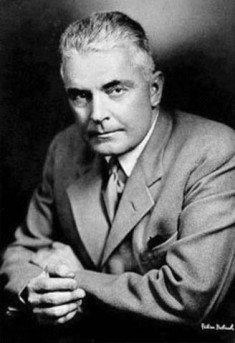| John B. Watson | |
|---|---|
 |
|
| Psychologist | |
| Born | Jan. 9, 1878 Travelers Rest, South Carolina |
| Died | Sep. 25, 1958 (at age 80) |
| Nationality | American |
John B. Watson made a tremendous contribution to the field of psychology. He is often credited with establishing the school of psychology noted for behaviorism. From this, areas as diverse as child rearing and marketing can be examined through the lens of a behaviorist. Watson also achieved some infamy for his involvement in the “Little Albert” experiment. Overall, his contributions to the field were positive and noteworthy.
Watson’s Early Life
John B. Watson was born on January 9, 1878, in Traveler’s Rest, South Carolina. His early childhood was somewhat tumultuous as he did not share his mother’s passion for religion. In fact, he developed a somewhat hostile attitude towards religion as he grew older. His father, a severe alcoholic, left home to live a life with other women and this left young Watson very angry and bitter.
Watson’s mother eventually sold the family farm in the rural section of the state and moved to Greenville, which was more urban. She hoped the move would afford Watson with more opportunities in life. In many ways, the move did. Through living in a more populated area, Watson saw a newer and more diverse group of people. It can be said these experiences helped him gain the insights he would later draw on in his later work in behaviorist psychology.
Unlike many other influential figures in psychology, John B. Watson was not known for his early academic successes. In fact, Watson was a very poor performer in school. He also had quite a number of disciplinary issues. Yet, he was able to enroll in Furman University thanks to his mother’s help.
Prior to enrolling in the university, few gave Watson much of a chance for success. Teachers deemed him lazy and insubordinate. On the university level, Watson showed an incredible turnaround. He entered into the undergraduate program at 16 and earned a master’s degree by the age of 21.
What truly plagued him during this time was the fact he knew he utterly lacked social skills. Watson had very few friends and he never truly understood how to overcome his social foibles and connect with others.
Further Academic Pursuits
Watson was able to enroll in the University of Chicago. During this time he made strong connections with a great many people on the faculty. His relationships with these people influenced his interest and study of psychology and aided in his own trailblazing ventures into the research of behaviorism.
His Ph.D. dissertation centered on the subject of white rats and their psychical development. The roots of his insights into behaviorism are present in this dissertation.
Soon after earning his Ph.D., Watson married and took a job on the faculty of John Hopkins University. A disastrous scandal emerged when he was caught having an affair with a graduate assistant. This led to his dismissal from the faculty and also a divorce.
The Emergence of Behaviorism
 In 1913, Watson published the article Psychology as the Behaviorist Views It. The complex article would go on and explain that human beings should be observed in a manner not much removed from how animals are studied. In essence, human beings should be examined from a natural science perspective.
In 1913, Watson published the article Psychology as the Behaviorist Views It. The complex article would go on and explain that human beings should be observed in a manner not much removed from how animals are studied. In essence, human beings should be examined from a natural science perspective.
Most importantly, he rejected the notion psychology should be based on the study of consciousness. He felt that studying human behavior was more realistic and reliable. He would go on to write a book on the subject titled Behaviorism.
Watson launched a behaviorism experiment with an infant named Albert that involved a series of emotional tests based on modified white rat tests. The infant was only nine months and some of the testing seemed very inappropriate for a child so young. The controversial results were eventually published in a 1920 issue of Journal of Experimental Psychology.
Later, Watson would move on and invest time in a much less controversial area: advertising. His studies in this area examined the relationship between marketing and behaviorism.
Later Years and Death
As he was nearing the age of 80, Watson received a great award from the American Psychological Association for his work in the field. Long retired, John B. Watson passed away on September 25, 1958, in New York City.